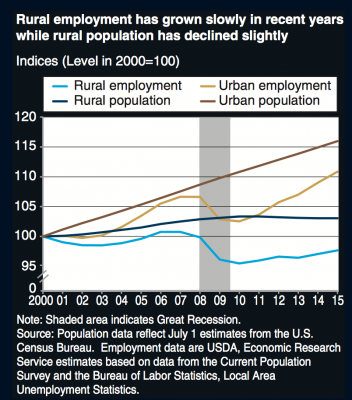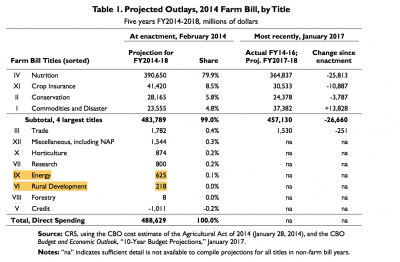The House Agriculture Committee unveiled a draft farm bill Friday that would revamp a key international food aid program, boost risk management options for specialty crop growers and nullify California's…
House Ag Subcommittee Hearing: Rural, Energy Issues
As part of its ongoing preparation for the 2018 Farm Bill, the House Agriculture Committee held a Subcommittee hearing yesterday delving into rural development issues and energy programs.
In his opening statement, Subcommittee Chairman Austin Scott (R., Ga.) noted that, “Every day our young rural citizens look around them, assess their lives, and try to make the best choices they can about their futures.
Unfortunately too many feel they have more opportunities somewhere else, and when they leave, they leave behind hollowed out communities that grow older, that become less adaptable, and that are unable to maintain their quality of life.
“With today’s hearing, we will begin to examine ways we can reverse that cycle.
“For many rural communities, rural development initiatives help to offset the high fixed costs of providing basic services like clean water, reliable electricity, and universal phone service. Residents of these communities simply would not be able to afford to live there without these key investments. Federal support for infrastructure remains a key part of our commitment to rural America.”

Subcommittee Ranking Member David Scott (D., Ga.) pointed out in his opening remarks that, “These programs help keep the lights on for our rural residents, provide broadband access, give our rural businesses and entrepreneurs access to hard to find capital, help our farmers’ bottom lines, and help provide essential community facilities like emergency response, schools, hospitals, roads, and long-term care housing. It’s really remarkable to think about all we’ve tasked USDA to do and the vision needed to make these programs work.”
#Counties are responsible for making significant investments in our nation's essential infrastructure- Renville Co., @MNcounties Cmsr. Fox. pic.twitter.com/ekCurwoIb1
— NACo (@NACoTweets) March 9, 2017
Bob Fox, the Chair of the Renville County Board of Commissioners (Minnesota), offered testimony on behalf of the National Association of Counties and explained that, “According to our analysis, Rural America is still feeling the effects of the Great Recession. After a decade, almost half of small county economies have yet to return to pre-recession job levels compared to only 13% of large county economies. My own county economy, Renville County, Minnesota, has yet to recover all the jobs lost during the last recession.”
He added that:
Economic growth is also slowing down across rural counties. The overwhelming majority of rural county economies added jobs at a slower pace in 2016 relative to 2015. In my home state of Minnesota, job growth accelerated in only 7 percent of county economies last year…Wages in most rural county economies are growing slower than last year.
Recall that USDA’s Economic Research Service (ERS) recently pointed out (“Rural America at a Glance, 2016 Edition“) that, “[T]he overall rural employment level remains well below its pre-recession level. Meanwhile, urban employment has risen more than twice as rapidly in recent years and was 4 percent above its 2007 level by 2015.”

R. Craig Cook, the COO of Hill Country Telephone Cooperative, Inc. (Ingram, Texas) provided testimony on behalf of the NTCA–The Rural Broadband Association and explained that, “As this committee deliberates the upcoming Farm Bill reauthorization, please be mindful that access to capital for rural broadband projects is limited. Smaller broadband providers like Hill Country and other NTCA members have only a few options for financing network construction. Small rural broadband providers cannot walk into large commercial banks to obtain financing for a network that will serve a small number of people over a large area, with the payback measured in decades rather than years.
“Cost-effective Rural Utilities Service (RUS) loans offered through the U.S. Department of Agriculture (USDA) are therefore an essential resource for small providers that serve rural America. Apart from RUS, only a few committed, mission-driven lenders like CoBank and the Rural Telecommunications Finance Cooperative (RTFC) typically provide financing to enable small rural providers to build networks in their communities.”
.@HCTC Craig Cook testified about broadband, rural development during @HouseAgNews #TheNextFarmBill hearing https://t.co/IlFrQS7uNx pic.twitter.com/o0kaFCsAQj
— NTCAconnect (@NTCAconnect) March 9, 2017
Mr. Cook added that, “NTCA urges the committee to continue to support the RUS Broadband Loan program that is subjected to the Farm Bill reauthorization process at or above current funding levels as you formulate recommendations. Furthermore, we urge the committee to continue its long history of support for the Telecommunications Infrastructure and Community Connect programs that are also vital to the ongoing deployment and maintenance of advanced communications infrastructure throughout rural America.”

Dennis Chastain, the President and CEO of Georgia Electric Membership Corporation pointed out at yesterday’s hearing that, “[Rural Utilities Service (RUS)] loans help electric co-ops reduce costs and improve reliability for our members by financing basic maintenance like replacing poles and wires. But it also helps us fund projects to make our systems more modern, efficient, and secure.
“RUS depends on a yearly appropriation from the Agriculture Appropriations bill. We are grateful that Chairman Conaway and Ranking Member Peterson have consistently led a bipartisan letter with several hundred signatures to appropriators advocating for robust RUS funding. Part of our support comes from the fact that we are such a good investment for the federal government. The President’s Budget request for 2017 estimated that the federal government could earn up to $300 million in net revenue from RUS loans. We thank you for your past support of RUS, and ask that you please continue to provide that support.”
Our own John Duff testified today before Congress supporting a strong #farmbill energy title for #sorghum. Read more https://t.co/3KgSL35xkO pic.twitter.com/QxNKdewIDk
— NSP (@SorghumGrowers) March 9, 2017
And John Duff of the National Sorghum Producers indicated yesterday that, “As technology has evolved so too have energy title needs. While many programs authorized by the 2002 and 2008 Farm Bills provided much needed support during a time when little was known about the commercial viability of many renewable energy technologies, today’s environment is significantly different. Therefore, we strongly encourage the Committee to consider combining and updating programs to better suit the needs of the current renewable energy industry.
In summary, the next energy title must focus more on incentivizing greater energy production by proven market participants than on de-risking unproven technology development.
Also yesterday, James C. Greenwood, the President and CEO of the Biotechnology Innovation Organization (BIO) included some of these Farm Bill recommendations in his written testimony.
- Section 9002 Biobased Markets Program, known as the BioPreferred® Program–
“USDA should establish within the BioPreferred® Program’s voluntary labeling and procurement system a campaign to increase public awareness and acceptance of renewable chemicals and biobased products…[W]e ask Congress to consider increasing mandatory funding for this program to $10 million annually.”
- Section 9003 Biorefinery, Renewable Chemical, and Biobased Product Assistance Program (BAP)-
“BIO urges the Committee to amend the language in Section 9003 to ensure stand-alone renewable chemical facilities are eligible in the next Farm Bill. BIO also requests the Committee work with USDA to ensure timely implementation of the new rules that will come as a result of the next Farm Bill to ensure USDA makes funding available in a timely manner. Maintaining mandatory funding for this program is crucial for its success in enabling companies to secure the financing they need to commercialize biorefinery projects.”
- Section 9005 Bioenergy Program for Advanced Biofuels–
“It is critical the Committee maintain robust mandatory funding for Section 9005 to help grow and expand the advanced biofuels industry nationwide.”
- Section 9007 Rural Energy for America Program (REAP)-
“The program has been oversubscribed year after year; it should be expanded both in terms of funding and scope in the next Farm Bill.”
- Section 9008 Biomass Research and Development (BRDI)-
“It is critical the Committee maintain robust funding for BRDI. Cuts in the appropriations process have led to smaller grants, limiting the diversity of projects.”
- Section 9010 Biomass Crop Assistance Program (BCAP)-
“The key impediment to BCAP’s success has been the continual reduction of mandatory funds by appropriators and delays by USDA in implementing the program.”





